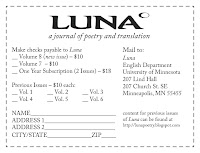 The Book of Truants & Projectorlight
The Book of Truants & ProjectorlightJOSHUA MARIE WILKINSON
Octopus Books, $6
Crack open Wilkinson’s chapbook and the dusty mothlight glows on a little bit of this (a picturebook, starlings, “a kind of note more easily read / when torn in two equal pieces”) and a little bit of that (marbles, grass, “a country song / in your bottle of blood”). The poems here are snapshot narratives, each one a collection of meticulously posited images. Six of the sixteen poems are titled “still life with...” (“still life with starlings in the attic,” “still life with bullfrog,” “still life with shark tooth, sleeping boy, moon [missing], & treefrog,” etc.), and the canvases on which they reside are immense. But the poems are not static. They move across landscapes populated by gardens, animals, bicycles, bellies, water, and ominous weather.
This three-part chapbook is aptly titled: the stories and images proceed frame by frame, and there are times you’d swear you could hear the clicking of the projector reel. The poems are brief, but their trajectories are endless. Worlds spring to life in the poems’ first lines:
This three-part chapbook is aptly titled: the stories and images proceed frame by frame, and there are times you’d swear you could hear the clicking of the projector reel. The poems are brief, but their trajectories are endless. Worlds spring to life in the poems’ first lines:
The dusk light reeled backwards & all the children marched into the collated fields.
(“dusk light / long light”)
...
Here is the kingdom of the phonebooth.
(“sleeping & arriving alike”)
...
There are four gashes in the moon & if you look through this glass you will see them all & the lost satellite, spinning.
(“still life with satellite, radish garden, mailboxes, & deer”)
The first and third sections of the book are prose poems. The second section is in Wilkinson’s more familiar fragmented lineation that would be right at home in his most recent full-length collection, Lug Your Careless Body Out of the Careful Dusk (winner of the Iowa Poetry Prize). As in his previous books (including the wonderful chapbook published by New Michigan Press, A Ghost As King of the Rabbits), Wilkinson builds a narrative across poems, crafting what is, in essence, a book-length poem. The beauty of his work is in how each poem has both nothing and everything to do with each of the other poems. They converse with each other through queries, shared images, and a language that is both measured and ephemeral, but taken individually, they are striking and complete.
The poems in The Book of Truants and Projectorlight inhabit serene, magical worlds of solemn whimsy in which everything is familiar, but shrouded in a dream-like fog. It’s like a visit to the attic, a day spent at the Museum of Collected Things, and all you need to do is stop and look around for a bit—you’re bound find something to stow in your pocket and carry away.
The poems in The Book of Truants and Projectorlight inhabit serene, magical worlds of solemn whimsy in which everything is familiar, but shrouded in a dream-like fog. It’s like a visit to the attic, a day spent at the Museum of Collected Things, and all you need to do is stop and look around for a bit—you’re bound find something to stow in your pocket and carry away.
by Nate Slawson
This is the second in a series of eight reviews on the chapbooks from Octopus Books.







